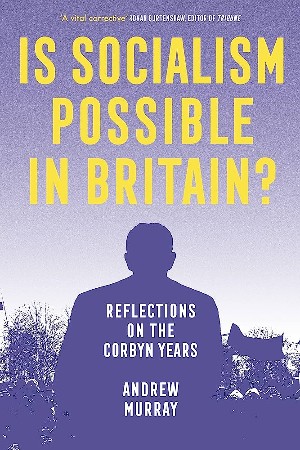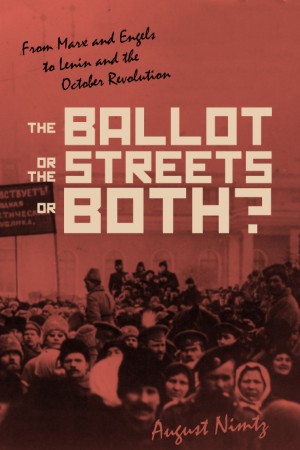 Keir Starmer and Rachel Reeves. Photo: Keir Starmer / CC BY-NC-ND 2.0
Keir Starmer and Rachel Reeves. Photo: Keir Starmer / CC BY-NC-ND 2.0
With Labour likely to win the general election and form the next government, Lindsey German provides a guide to essential reading on elections and the Labour Party
Labour has always been a struggle between its left, representing many of the activists, and the right who tend to dominate parliament and the union leaderships. The right has always won out in that struggle, nowhere more than now.

Caroline Benn’s Keir Hardie (Richard Cohen) is both a rigorous and detailed biography of Labour’s first leader and one of its main left wing heroes, and a study of these different strands within Labour that existed even before it formed a government. Hardie died in 1915, demoralised by the jingoism embraced by his party over the First World War.

Oliver Eagleton does a good job of outlining the politics of the other Keir, now on the brink of forming a majority Labour government which promises to deliver virtually nothing for the working class people who elect it. His The Starmer Project: a journey to the right (Verso) tells you everything you need to know about the man and his politics and perhaps helps to explain the vacuousness that is the hallmark of his debating style.

The failure of Corbynism which led to the rise and ever rightward moving politics of Starmer has led to much analysis, some better than others. Andrew Murray was an adviser to Corbyn and his Is socialism possible in Britain: reflections on the Corbyn years (Verso) gives lots of inside information but also looks at the wider issues of Labourism and the left in Britain.

Alex Nunns The Candidate (OR Books) tells of the rise of Corbyn in 2015 against all the odds and shows what hope there was from so many on the left about the prospect of a socialist leader. This inspired equal levels of despair from those on the right who were determined to destroy Corbyn by whatever means possible.

Understanding the failure means going beyond the tactical errors which were important but not necessarily decisive. The failure to sufficiently reject the IHRA definition of anti semitism was one such. But up against Corbyn was the array of the British state and political establishment, not to mention the media. This isn’t, as they say, an accident but part of the way in which the ruling class maintains its power. Elected representatives are very much subordinate to that. The British State: a warning by Chris Nineham (Zero Books) points a lot of this out and is required reading for anyone wanting fundamental change in Britain.

History doesn’t repeat itself but there is much we can learn from it. Parliamentary Socialism by Ralph Miliband (Merlin) tells you why Labour never confronts the state and therefore why it is doomed to fail. While his writing clearly had too little impact on his sons, David and Ed, Ralph’s 60 year old book is a classic.

So too is Paul Foot’s The Vote: How it was won and how it was undermined (Verso). This is a tremendous study of the fight for democracy through the Levellers to Chartism to the Suffrage movement. It then details how working class people’s votes become less and less central to change – and how Labour is complicit in this development. It is written by a revolutionary socialist with total commitment to struggle from below.

August Nimtz is a US writer and Marxist. His The Ballot or the Streets – or Both? (Haymarket) was written in response to the rise of Corbyn and Sanders in the US. It is a polemic against those who totally dismiss voting and elections as they do have an impact on class confidence and organisation. Here he looks at the views of Marx and Engels on democracy – in their native Germany they had to wage a revolution to achieve even the most basic forms – and also at Lenin. His views are calumnied because of the subsequent degeneration of the Russian revolution, but he too developed a sophisticated Marxist analysis of the relationship between elections and class struggle, not least in relation to the individual terrorism of the Narodniks.

If you want to read him directly, get a copy of Lenin’s Left Wing Communism: an Infantile Disorder (Marxist Internet Archive) where he deals with the arguments of those who after the First World War thought voting was irrelevant. He argued that it was not the most important form of struggle but that it was vital to use the arena to win over those workers not yet committed to revolution.

Finally, I haven’t read Andy Beckett’s The Searchers (Penguin) which looks at five current or former Labour left MPs, including Tony Benn. But it looks interesting. To me, Benn did his finest work when he left parliament and became the figurehead of mass movements. Corbyn too has built a huge following and is now having to fight for his seat outside Labour – a fight that we should all support. But the lesson of the Corbyn years – as well as the history outlined here – is that there is absolutely no value to ‘stay and fight’ in Labour, which will never allow its left to succeed. Instead we have to build a genuinely socialist party that can take on its enemies in the state.
Join Revolution! May Day weekender in London
The world is changing fast. From tariffs and trade wars to the continuing genocide in Gaza to Starmer’s austerity 2.0.
Revolution! on Saturday 3 – Sunday 4 May brings together leading activists and authors to discuss the key questions of the moment and chart a strategy for the left.

